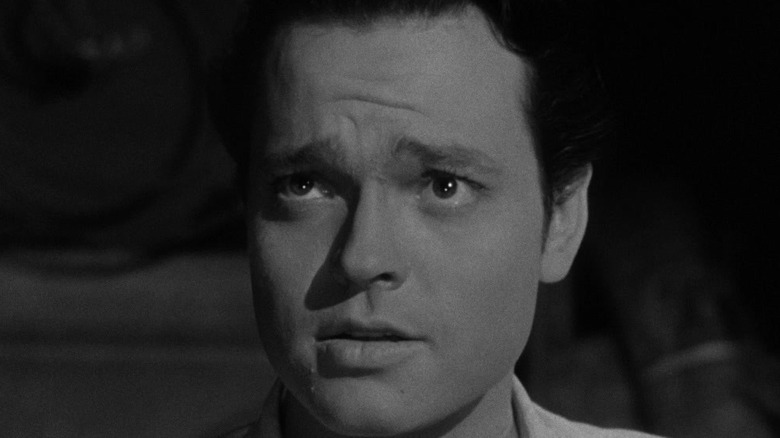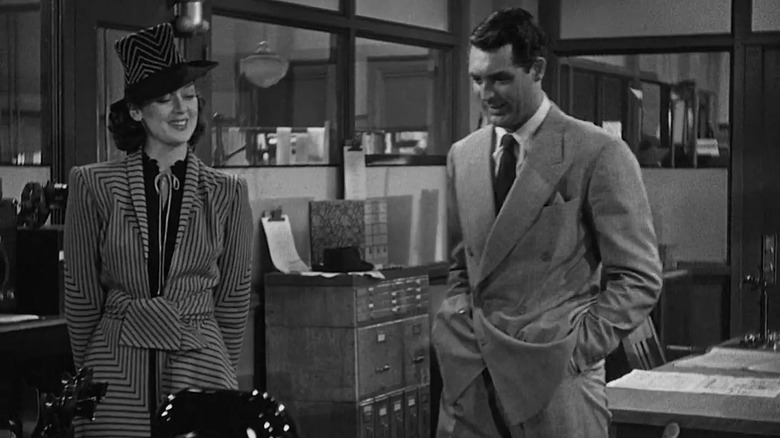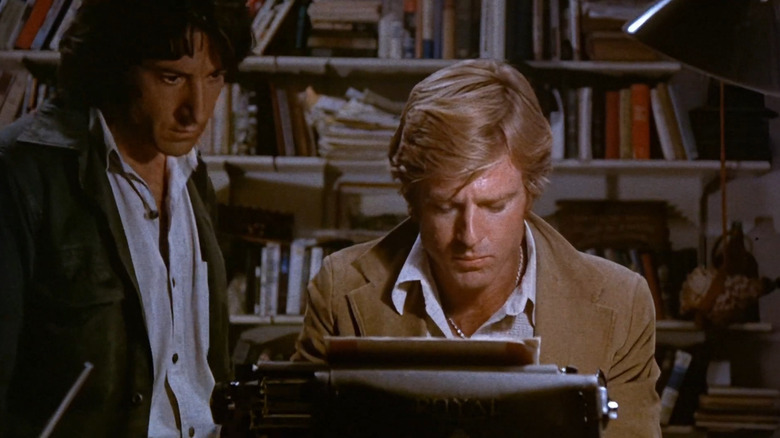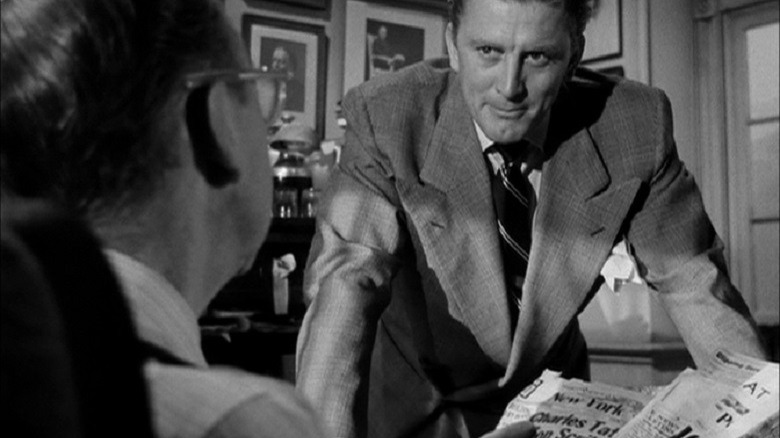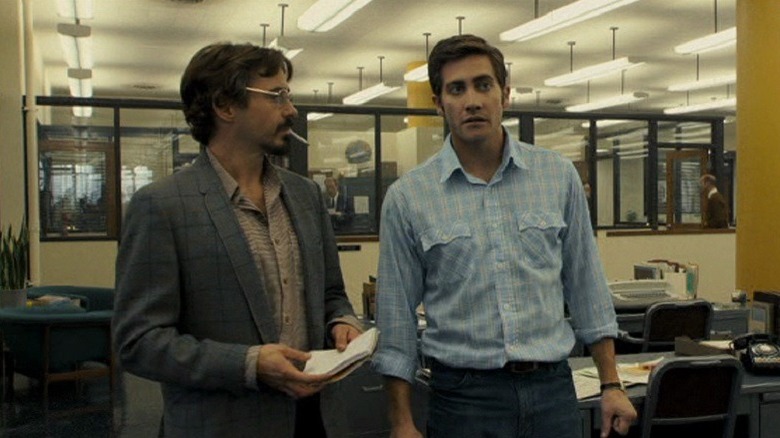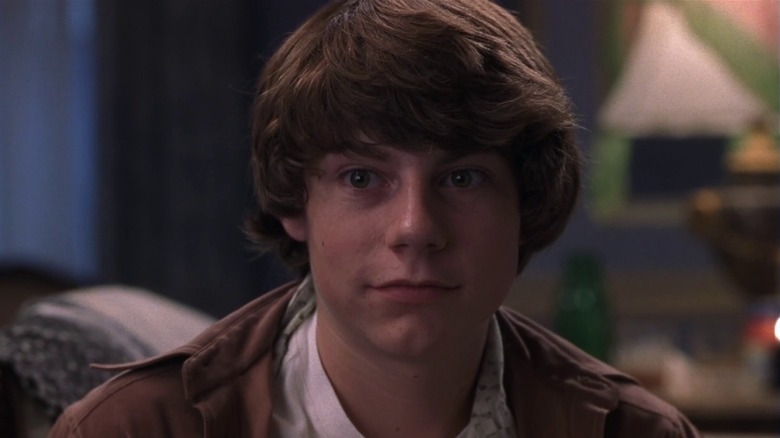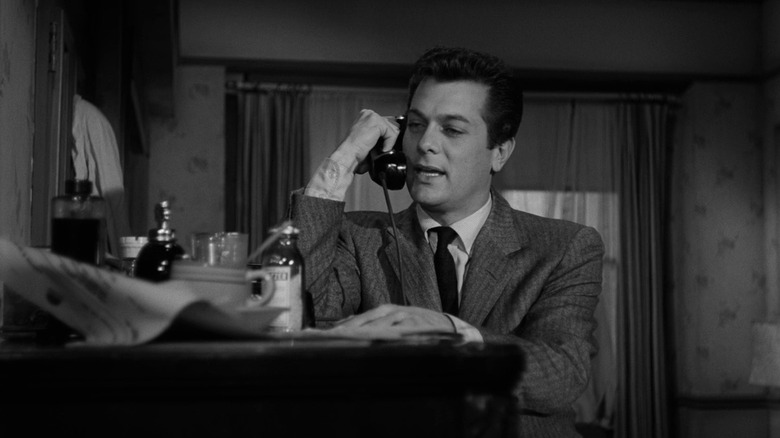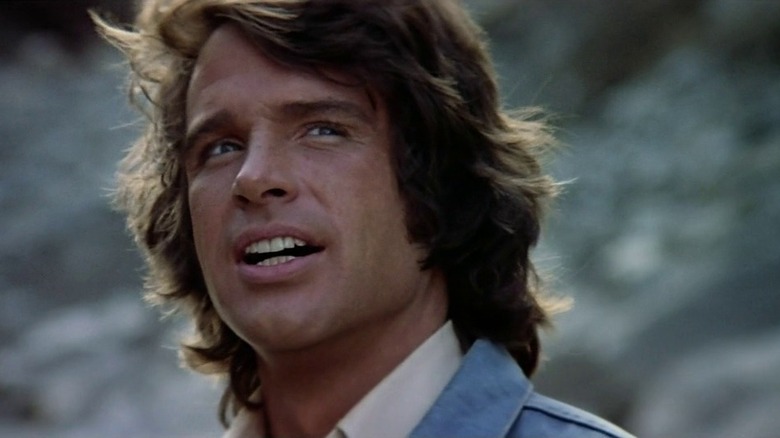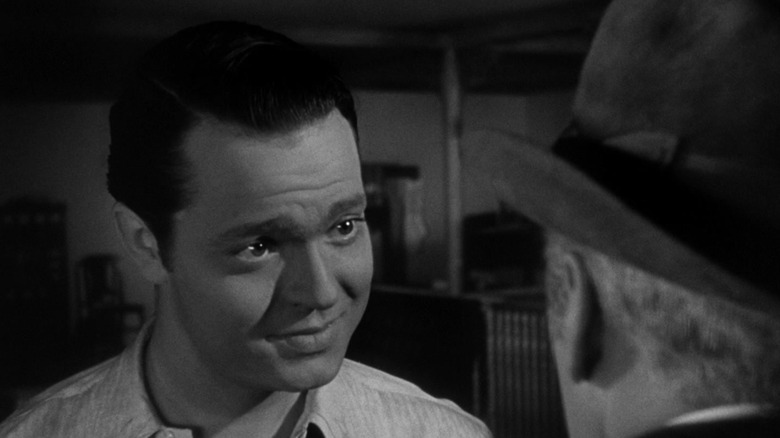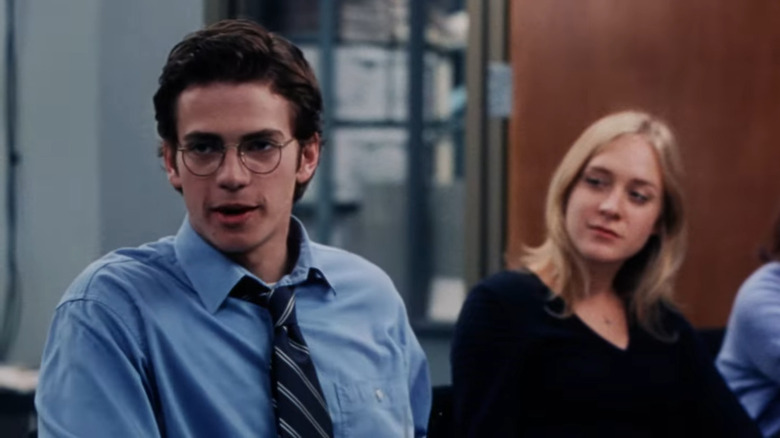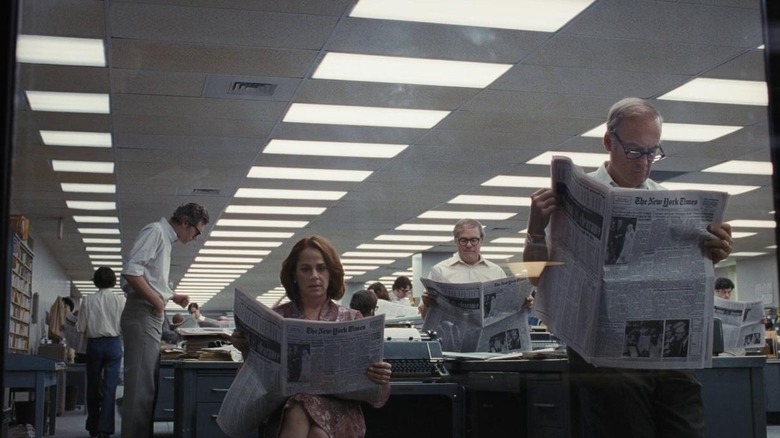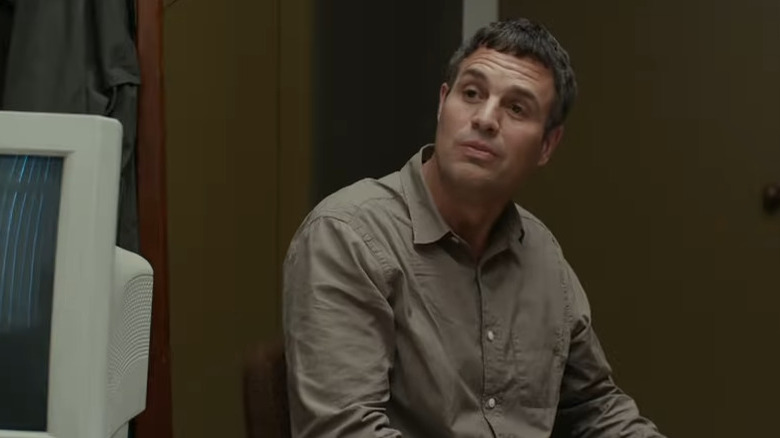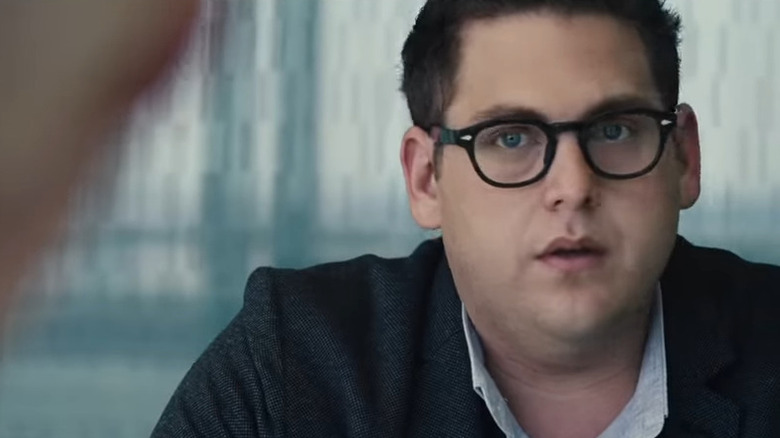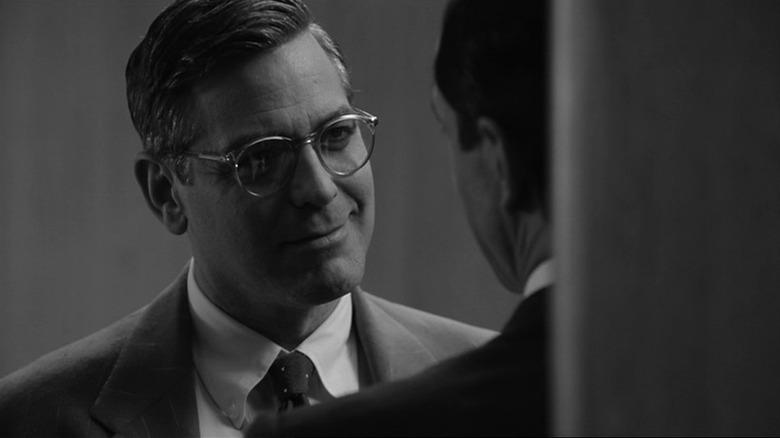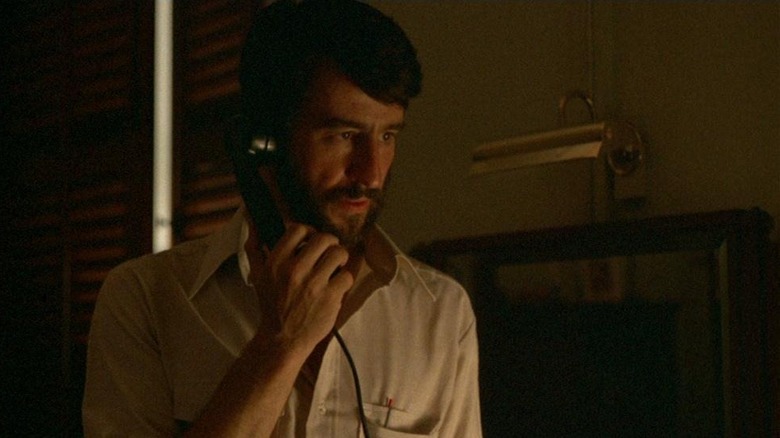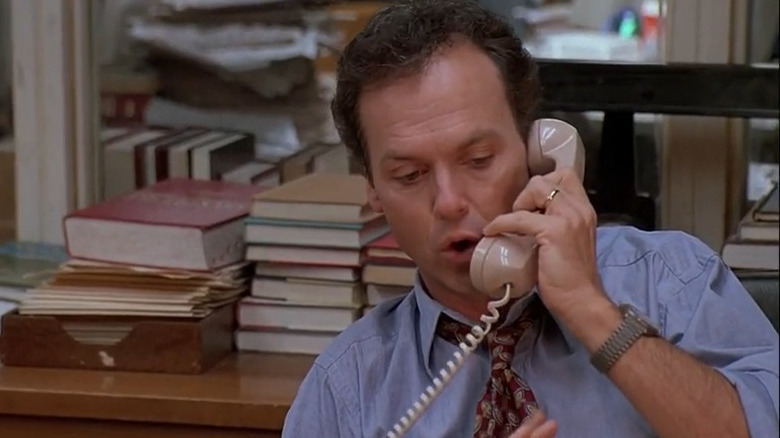15 Movies About Journalism That All Aspiring Writers Should See
There's nothing like a good story, and it turns out that the process of writing a good story can often make for an engaging movie as well. Across a variety of different genres — from screwball comedies to taut, political thrillers — there are plenty of films that look at the process of writing, and more specifically, journalism. Whether it is focused on chasing a story, the pressures of a bustling newspaper office, or a desperate fight to uphold the very nature of democracy, films about journalists and writers are usually a winning formula.
The press may come under scrutiny — often by those in the highest seats of power — but the role they play is vital. News Media Association states that the press is "the public's watchdog, activist, and guardian as well as educator, entertainer, and contemporary chronicler." With so many different roles and playing such a key part in modern society, it is no wonder that movies so often use journalism as the basis for telling a story. Of course, there is a darker side to the profession as well, with many unscrupulous individuals the power they wield as a chance to spread slander, rumors, and gossip.
Words hold a potency quite unlike any other weapon, and while some may have the power to communicate the truth, others have the ability to destroy a reputation in an instant. For aspiring writers or anyone who just loves an enthralling story, here are 15 movies about journalism that you need to see.
His Girl Friday
Arguably one of the finest screwball comedies, Howard Hawks' "His Girl Friday" takes a welcome, humorous approach to journalism. Walter Burns (Cary Grant) is a no-nonsense newspaper editor who manages to persuade ex-wife and former reporter for the paper, Hildy Johnson (Rosalind Russell) to join him for one last story. The promise of a potential scoop proves too difficult for Hildy to resist, so she agrees to investigate the case of a man convicted of murdering a policeman.
Bolstered by the star power of its two leads and the witty rapport of Charles Lederer's brilliant script, "His Girl Friday" is a film that is full of surprises, mishaps, and spontaneity. Considering that it was released in 1940, it also offers a refreshingly progressive female character, with Hildy more than able to hold her own against her hard-boiled ex-husband. Throughout the film, Hildy is guided by her instincts, and it is satisfying to see her hunches pay off when many of the men in the film doubt her credibility. Even when the story gets a little farcical, "His Girl Friday" is incredibly watchable, and offers a different depiction of a tenacious reporter, always willing to put the story above anything else. Mad, brilliant, and consistently hilarious, "His Girl Friday" creates a welcome sense of fun in a business that can often appear to be very austere.
All the President's Men
Arguably the benchmark for movies about journalism, "All the President's Men" remains one of the strongest arguments for the importance of the free press — particularly when it pertains to scandals relating to the highest seats of power. Based on the book of the same name, the film focuses on two reporters for The Washington Post as they research a break-in at the Democratic Party Headquarters. Bob Woodward (Robert Redford) and Carl Bernstein (Dustin Hoffman) are rival reporters and reluctant to work together, but when they are both assigned to cover the story, they begin to uncover the corruption and deceit that goes all the way to the top.
The Watergate scandal — as it later became known — is one of the most significant events in American political history, and "All the President's Men" explores the vital work undertaken by journalists. Their relentless hunt for the truth, even when their lives are at risk, is the ideal material for a compelling drama. Writers may sometimes feel as though their words have no impact, but this film proves that the right words have the power to hold even the President to account. Throughout "All the President's Men," there is a sense of urgency; that this is a story that has to be told, and that the consequences of not telling it could have much larger ramifications.
Ace in the Hole
In this scathing satire from director Billy Wilder, Kirk Douglas plays unscrupulous reporter Chuck Tatum — a morally bankrupt man who has found himself on the outskirts of Albuquerque after being fired from numerous papers. While his reputation precedes him, Tatum offers a tantalizing prospect to the buttoned-up "belt and braces" boss of a small local newspaper and promises a story that can make him a fortune. Sent into the desert to cover a rattlesnake hunt, Tatum happens across the potential for a bigger story — a man trapped in a cave.
For all his faults, Tatum knows what makes a good story, and most importantly, he knows how to spin it in order to benefit himself. He is far from the model of what makes a "good" journalist in the moral sense of the world, but his tenacity and natural charm make him an intriguing character. "Ace in the Hole" demonstrates how quickly a story can cascade into a media circus, and offers a scathing — and surprisingly relevant — dissection of the business. While it may live in the shadow of Wilder's 1950 film noir, "Sunset Boulevard," 1951's "Ace in the Hole" gives us an equally dark and biting look at the cult of celebrity and the nature of entertainment, this time through the lens of journalism.
Zodiac
Few films are as thorough as David Fincher's "Zodiac" when it comes to the exploration of the blood, sweat, and tears that can go into telling a story. Based on the true events surrounding the Zodiac killer, this procedural thriller focuses on the journalists and police officers investigating his crimes — who are left bewildered by the cryptic messages and clues. While "Zodiac" is driven by dialogue more than it is by action, the film is still remarkably engaging. With the emphasis on conversations, "Zodiac" brings us alongside those who are obsessing over and analyzing every detail of the puzzling crime. The sheer weight of the task at hand effectively casts a feeling of dread and foreboding over the film that is palpable.
Similarly, director David Fincher's almost clinical attention to detail in the film adds to the sense of realism. It can be frustrating in a film where plot contrivances can lead the characters to resolve things too quickly or make unbelievable assumptions that just so happen to be right. There is none of that here, instead, there is a genuine feeling of frustration and futility as the investigators mull over the clues — something that will be deeply relatable for anyone who has had to tackle seemingly impenetrable information and turn it into something readable.
Almost Famous
While they say you should never meet your heroes, when 15-year-old William (Patrick Fugit) is offered the opportunity to do just that, it's an opportunity he simply can't refuse. A passionate music fan and aspiring writer, William is shocked when he is contacted by Rolling Stone magazine to interview the band, Stillwater. Against the protestations of his mother (Frances McDormand), William heads out on a once-in-a-lifetime journey, joining the band on the road and learning plenty about music — and himself — along the way.
While it was made in 2000, "Almost Famous" beautifully evokes the 1970s, which are often seen as the glory years for classic rock. As well as the pitch-perfect costumes and locations, it captures the feeling of freedom and immense creativity in this decade, as well as poignant nostalgia for the simpler times. For most of us, being offered an opportunity like this is the stuff of dreams and fantasy, but for William, it becomes a reality — although it's not always as glamorous as you might imagine. The main idea throughout "Almost Famous" is that despite all the turbulence, there is great joy in turning something you love into a career. Like many other vocations, writers may face setbacks, but "Almost Famous" shows that good things can come from following your dreams.
Sweet Smell of Success
Contrary to the popular phrase, words can hurt almost as much as "sticks and stones." Words in print in particular can hold immense power and weight — something that 1957's "Sweet Smell of Success" explores. Burt Lancaster plays J.J. Hunsecker, a ruthless and highly influential New York columnist who holds the power to make or break someone's career. When his sister, Susan (Susan Harrison), begins dating someone he doesn't approve of, Hunsecker hires crooked press agent Sidney Falco (Tony Curtis) to start spreading salacious rumors and tear the couple apart.
Many film noir movies focus on violence and crime, but "Sweet Smell of Success" takes a rather different approach, examining the surprisingly cutthroat world of journalism. While he is positioned as the protagonist, Falco is a reprehensible character with little regard for the lives he may ruin in the process of trying to be a "somebody" himself. Living in the shadow of Hunsecker, Falco desires — more than anything — to be a formidable figure in New York, and while his tenacity is admirable, it is hard to align with his propensity for corruption, blackmail, and deceit.
"Sweet Smell of Success" presents an intoxicating, sleazy snapshot of New York City and the grittier, darker side of journalism. For writers today — in what can seem like a crowded market with so many voices jostling for attention — this film offers a cautionary tale on what can happen when you allow your ruthless ambition to overtake all reason and morality.
The Parallax View
While perhaps best known for 1976's "All the President's Men," director Alan J. Pakula made a trio of timely thrillers in this decade, often referred to as "The Paranoia Trilogy" — a series of films that demonstrated that "Someone is always watching, listening, or following" (via Entertainment Weekly). Sitting between the aforementioned film and 1971's "Klute" is "The Parallax View." In the wake of the John F. Kennedy assassination in 1963, "The Parallax View" follows reporter Joe Frady (Warren Beatty) as he investigates an organization that targets political figures, following a tip-off from television journalist Lee Carter (Paula Prentiss). She informs him that witnesses to an assassination three years prior are being targeted themselves, and Frady's initial skepticism is refuted when Carter herself is found dead.
In a theme that runs through all three films in Pakula's Paranoia Trilogy, "The Parallax View" zeroes in on the quest for the truth in a world full of political conspiracy, government cover-up, and distrust of authority. Told through the lens of the "everyman" reporter, and anchored by Beatty's charismatic performance, "The Parallax View" emphasizes the importance of the press when it comes to investigating and revealing the truth — especially when it pertains to those in positions of power. While most aspiring writers would hope not to face such dangerous situations, many will be able to relate to the thrill of chasing an excellent story such as this one.
Citizen Kane
While remembered as a landmark film, and possibly the greatest ever made (via Britannica), it shouldn't be overlooked that "Citizen Kane" is also one of the very best films about journalism. In fact, its exploration of journalism is twofold thanks to the film's multiple storytellers. After Charles Foster Kane (Orson Welles) — a wealthy publishing tycoon — utters the immortal words, "Rosebud" on his deathbed, newspaper reporter Jerry Thompson (William Alland) is assigned to investigate the possible meaning behind this cryptic phrase. Told both in the present — with Thompson interviewing Kane's friends and associates — and in the past through flashbacks of Kane's extraordinary rise to the top, the audience is brought along for the ride to learn more about the enigmatic figure.
What is perhaps most fascinating about "Citizen Kane" is the way it explores the duality of the story we would write about ourselves, and the one that others might write about us. The version of Kane that he presented to the world was one of power and authority — and unbeknownst to many was the traumatic moment from his childhood when he was taken away from his mother and entrusted to the banker, Walter Parks Thatcher (George Coulouris). The satisfying sting is that the true meaning of "Rosebud" — and the connection to the aforementioned trauma — is only revealed to the audience at the end, making us privy to an element of the story that even eluded those who supposedly knew Kane best.
Shattered Glass
Between his appearances in the "Star Wars" prequel movies, Hayden Christensen starred in this compelling 2003 drama based on the true story of Stephen Glass — a talented young journalist for The New Republic magazine. Glass' career came to an end when it was discovered that many of the pieces he had written contained information that had been partially — or in some cases entirely — fabricated. The film — based in part on the article written about Glass in Vanity Fair — paints a portrait of a man consumed by the pressure to succeed, who successfully duped a number of editors, fact-checkers, and fellow journalists before the truth eventually came out.
"Shattered Glass" is fascinating, and the background reading — including the exposé written by Forbes reporter Adam Penenberg (portrayed in the film by Steve Zahn) — is just as absorbing. While Christensen gives a career-best performance as the disgraced journalist, Peter Sarsgaard is truly exceptional as The New Republic's recently appointed editor, Charles Lane.
At its core, "Shattered Glass" explores the fine line that exists in journalism between the desire to tell a good story, and the impetus to tell the truth. Glass was undeniably a deft storyteller, but this quality also proved to be his undoing, and the lesson to take away from this film is that while the temptation may be there to embellish a piece by manipulating the truth, it absolutely isn't worth it.
The Post
In many ways, Steven Spielberg's 2017 film "The Post" is the perfect accompaniment to 1976's "All the President's Men." In terms of the historical events it depicts, it works as a prequel to Alan J. Pakula's classic film, and even borrows some visual clues for its ending that ties the two together beautifully (via Medium). The film focuses on Katharine Graham (Meryl Streep), the owner and publisher of The Washington Post. While Graham struggles to get her voice heard in the male-dominated boardroom, her paper is flagging against its competitors — namely The New York Times, who are planning to publish a damning exposé of the government's involvement in Vietnam. Assisted by the Post's editor Ben Bradlee (Tom Hanks), Graham is forced to decide between printing something that could potentially see the paper cease to exist, and the duty the press has to report on the truth.
While "The Post" covers a very specific time in history, its themes are universal, and it was particularly potent in 2017 when it was released (per Vox). The film portrays the notion of the power struggle between the media and the government, and the importance of the former to be allowed to report the facts without fear of being silenced, manipulated, or controlled by the latter. Speaking about the film's pertinence to today, Spielberg told USA Today, "The relevance is up to everybody. But obviously, sometimes bad things happen twice and history is certainly repeating itself."
Spotlight
An understated "David and Goliath" story with a slew of awards-worthy performances, "Spotlight" is a powerful depiction of the determination of journalists to tell an important story. Based on a true story, the film focuses on a small group of investigative journalists working for the Boston Globe, who uncovers a series of allegations of child sex abuse at the hands of priests in the Boston area. What begins as an investigation into a handful of local cases soon snowballs into a widespread web of cover-ups by high-ranking figures in the Catholic church, and the revelation that the abuse is not just systemic, but a global problem.
There are no big action scenes to speak of, and the performances are for the most part suitably restrained. The result is a powerful film that doesn't try to position the reporters as heroes but instead speaks to the incredible bravery of the survivors who came forward to share the traumatic things that happened to them. More than most films about journalism, "Spotlight" is honest about the hard slog that is involved. Despite the overwhelming odds being stacked against them — and the film's honest ending indicating this was only the beginning of the story — "Spotlight" demonstrates that small ripples can lead to big change as it hones in on the people behind-the-scenes who do such vital work.
True Story
As the title would suggest, 2015's "True Story" is inspired by real-life events — specifically, the intriguing relationship between reporter Michael Finkel (played by Jonah Hill) and Christian Longo (portrayed by James Franco), a man accused of murdering his wife and children. Finkel is highly ambitious and has worked his way up to a prestigious position at The New York Times. However, when it is revealed that he committed a cardinal sin of news journalism — using a composite character to tell a story about mistreated slave workers in Africa — he is fired. Now discredited and struggling to find work, Finkel strikes lucky when he is contacted to give an opinion on Christian Longo — who had assumed Finkel's identity when he was arrested in Mexico. Recognizing the potential for a story, Finkel agrees to meet with Longo to learn more about him.
As well as exploring essential journalism ethics, "True Story" presents an intriguing character study. The stripped-back filming style focuses on the two central performances and allows the story to do the talking. While Longo is the very definition of an unreliable source, it is fascinating to watch Finkel be drawn in by him, so consumed by the potential for the story to have a redemptive arc that he almost loses sight of his obligation to tell the truth. While it does feel like this story would be better served by a documentary, the compelling performances from Hill and Franco make this film worth a watch.
Good Night and Good Luck
With crisp black-and-white cinematography and a jazzy soundtrack, "Good Night and Good Luck" has a deliberate throwback feel as it tells the often-told tale of the press versus the government. Based on the real-life conflict between newsman Edward R. Murrow (played in the film by David Strathairn) and U.S. Senator Joseph McCarthy, "Good Night and Good Luck" focuses on the CBS news team who boldly reported the truth about McCarthy's rigorous anti-Communism campaign in the '50s.
In a similar way to films like "All the President's Men," there is a tangible sense of threat against those who are dedicating themselves to speaking out in dissent — making what would otherwise be a fairly sedate sequence of events feel genuinely dangerous. With George Clooney at the helm — as well as on-screen as producer Fred Friendly — the subject matter feels as though it is in very safe hands, with the desire to stay true to what happened as well as ensuring it is thematically relevant for modern audiences. "Good Night and Good Luck" is a handsomely made picture, presenting not just a compelling argument confirming why the press should be separate from the government, but a warning that television — and journalists — have a mandate to both inform and educate that should be taken seriously.
The Killing Fields
Captured with documentary-like realism, "The Killing Fields" is a harrowing and powerful drama — initially about the dangers of reporting under a totalitarian regime, and later about the human cost of a deadly genocide that saw nearly a quarter of Cambodia's population murdered (via Britannica). Set in Cambodia in 1975, the film focuses on two journalists — The New York Times reporter Sydney Schanberg (Sam Waterston) and local journalist and reporter Dith Pran (Haing S. Ngor) — caught up in the brutal takeover by the Khmer Rouge.
As well as being colleagues, Pran and Schanberg are friends and dedicated to helping each other no matter what happens. What "The Killing Fields" demonstrates more than anything, is how horrifyingly quickly a situation can turn into something incredibly dangerous. The real Schanberg was awarded The Pulitzer Prize for his work (via The New York Times), and while the film does show the reporter receiving an award, "The Killing Fields" is much less focused on the articles being written about Cambodia's fall, and much more attentive to the bravery of those caught up in the violence. It feels like a very human story, and the powerful performances from Waterston and Ngor — who won an Oscar for playing Pran — are a testament to the real people who lived through this ordeal.
The Paper
Working for a newspaper is undoubtedly an extremely high-pressured job. Not only are you adhering to tight deadlines — ensuring the reporting is both engaging and accurate — but you're also constantly in competition with other outlets to get the scoop and sell more papers. This is something that 1994's "The Paper" conveys perfectly. Set over a 24-hour period, the film covers a day in the life of newspaper editor Henry Hackett (Michael Keaton) as he deals with the stress of running a flailing tabloid, and trying to be there for his family — namely his pregnant wife, Martha (Marisa Tomei).
Setting a film like this over one day gives a real sense of urgency, as the race is on every single day to get things finished in time for the presses to start printing. While the concept of peeking behind the scenes is compelling enough on its own, the story that Hackett becomes involved in — the wrongful arrest of two Black teens on a murder charge — is equally interesting, and makes "The Paper" feel particularly timely. Hackett strongly believes in the boys' innocence, and once he acquires the evidence to back it up, he is determined to do the right thing and report the truth. The tight pacing of the film only adds to the sense of drama, and "The Paper" remains one of the most accurate depictions of the high stakes involved in the race against the printing presses.
